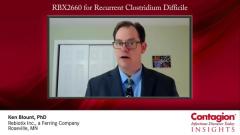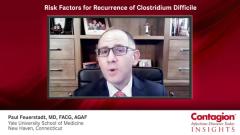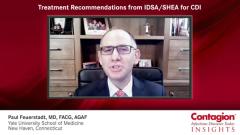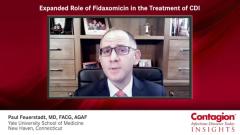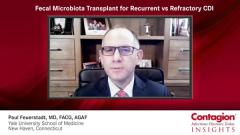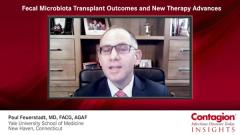
Fecal Microbiota Transplant Outcomes and Therapy Advances
Episodes in this series

Transcript:
Paul Feuerstadt, MD, FACG, AGAF: The question of which patients respond best to a fecal transplant who have a history of recurrent C difficile [Clostridioides difficle] is an important one, and there have been a number of case series that have looked into this. This question was tackled at a major infectious disease conference in October of 2020. They looked retrospectively at a cohort of patients who received a fecal transplant within their health care system. The fecal transplant material was supplied by a stool bank. They looked overall at 81 patients and found that 89% responded to the fecal transplant and had suppression of their C difficile infection and clinical cure. Right on target with what all or most of the other retrospective studies that have looked at this have shown. But they also showed that 36% of individuals also had transient loose stools and persistent loose stools after the fecal transplant. Now, this is a known effect. Fecal transplants have been shown to be associated with several subtle or less subtle adverse events, one of them being persistent loose stools, or transient loose stools, another being gas and bloating, another being constipation, and finally, mild abdominal discomfort. These [adverse] effects usually last several months, maybe 3 or 4 of them.
About 25% of people who get C difficile will get a post-infection IBS [irritable bowel syndrome]. Of the group that have more refractory symptoms, or more recurrences, they’re more likely to get post-infection IBS, and that is probably why there was a higher percentage seen here. Who is at greatest risk for getting a post-infection IBS? Patients who had IBS in the first place is what they showed here. Who are more likely to respond to the fecal transplant? Patients who received longer antimicrobial courses before the transplant, and patients with a higher body mass index. It’s unclear why patients with a higher body mass index will be more likely to respond to a fecal transplant, but it’s clear why patients who received more antimicrobials prior to the transplant are more likely to respond. They’re probably treated completely prior to the transplant, and the transplant is a reenforcing factor.
As we discussed previously, in patients who have recurrent C difficile, we want to treat both the bacteria, but also the microbiota. The antimicrobials, when patients have received prolonged antimicrobials courses, that has probably done the trick, and supplementing the colonization resistance with the microbiota gives it that knockout punch. The longer the antimicrobials, the more likely to get rid of the bacteria, reenforcing the colonization resistance with the fecal transplant.
When we approach patients with recurrent and multiply recurrent C difficile, thinking about the body mass index, thinking about the length of time that they’ve received vancomycin is essential to understanding who might respond, according to this study. But also understanding that patients might get transient or persistent loose stools afterward as a result of a post-infection IBS is also essential for all of us practitioners to consider when we use this treatment for our patients.
It is an exciting time in the world of therapeutics for C difficile infection, and recurrent and multiply recurrent infection, but 2021 is framing up to be a pivotal year in the management of recurrent C difficile infection. Why is that? That is because we have a number prospective randomized controlled trials of pharmaceutically produced fecal microbiota transplantation material that is possibly going to gain FDA approval in 2021.
The 3 products are from Rebiotix/Ferring [Pharmaceuticals], RBX2660, an enema formulation of fecal transplant, just completed a phase 3 prospective randomized controlled trial with positive topline results, showing a beneficial effect compared with placebo. SER-109 [from Seres Therapeutics, Inc], an oral capsule formulation of Firmicutes spores, a form of fecal transplant that also had positive, topline phase 3 prospective randomized-controlled trial results. And finally, CP101, from Finch Therapeutics, they completed a phase 2 prospective randomized controlled trial, and hopefully will be launching a phase 3 trial in 2021 for data analysis perhaps in 2022. We can see that more codified and less heterogenous forms of fecal microbiota transplant with potentially FDA approval are coming in 2021. With less heterogeneity of these products, we have more stable efficacy and safety data, and as clinicians we should be excited for more predictability of usage of these materials and better outcomes for our patients, with more widespread availability of such products.
Transcript Edited for Clarity
Newsletter
Stay ahead of emerging infectious disease threats with expert insights and breaking research. Subscribe now to get updates delivered straight to your inbox.


